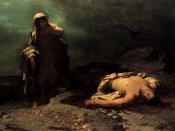The struggle with understanding the needs of individual's rights versus the rights of the higher power of government leads to political destruction within the state. "Power tends to corrupt and absolute power corrupts absolutely" (Lord Acton). Sophocles, author of the novel Antigone, displays acts of power corruption and explores the idea of a individual risking their life for free will and divine law against the positive law of the government. Sophocles seems to stress the significant importance of open communication and the willingness to compromise for the well being of society. The leadership qualities and decisions causes corruption, the unwillingness to compromise leads to destruction, a new hero is form.
In Antigone, King Creon is the most powerful man in Thebes. He makes the laws and punishes the ones who break the law. Creon's decision to deny the burial of Polynices body is the central conflict of the story.
Creon states, "if I tolerate treachery at home can I crush subversion anywhere in the city" (Antigone, 1947, p.144). Here, it shows that Creon must punish individuals that break the laws in order to keep his state stable and from corrupting. I believe that Creon is not strong and intelligent enough to be a good leader. Creon displays his lack of intelligence as his decision for denying burial of Polynice's body is certainly not an intelligent one because it interferes with the laws of the Gods and if you
defy the Gods, you will be punish. Teiresias states this about Creon's decision to have Antigone sent to her death, "[o]nly a fool is governed by self-will" (Antigone, 1947, p.153). Creon's decisions makes the Gods mad at him but it also makes the people of Thebes mad as they oppose to the punishing of Antigone. Creon's greed and pride makes him fail to see the fact that he makes a massive mistake in his Kingship and now he must pay for the circumstances that comes with defying the laws of the Gods from above.
Secondly, Creon and Antigone's unwillingness to compromise leads to their destruction. Creon is a man of extreme political power and believes in man creating the laws as oppose to Antigone who believes in the unwritten laws of the Gods. Creon is put in a difficult situation as King to create laws that are fair, for the people and beneficial to the people. A solution for Creon is, when creating a law do not interfere with the Gods. In Antigone's case, she is too stubborn to compromise because she believes in the laws of the Gods her whole entire life. So, there is not really a solution for Antigone. These two differences of beliefs are much to opposite and for one person to change the way they believe is most likely an impossible thing to do. Therefore, their unwillingness to compromise is not really their faults because they cannot really change their beliefs.
In addition, to label a clear and precise hero or heroin is very difficult. Some can say that Creon is the hero because he punishes Antigone who breaks his law to keep the state safe from law-breakers and potential threats to the state. However, Antigone can be the heroin because she dies for what she believes in and does have the support of most of the Thebans. It is certainly difficult to depict a true hero but the easy thing to do is make them both heroes and herons of tragedy.
To conclude, more effective communication and compromising skills is needed in order to ensure achievement. Sophocles teaches many lessons throughout the book that we all can learn from. In the play, the leadership skills is non-existent, leads to differences in beliefs and with all of this, two heroes emerge from darkness. The most important thing to learn in life is, wisdom is the key to success and happiness.
Works Cited
Sophocles. The Theban Plays
Markham: Penguin Classics, 1988


